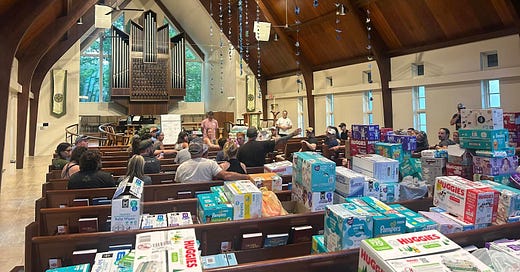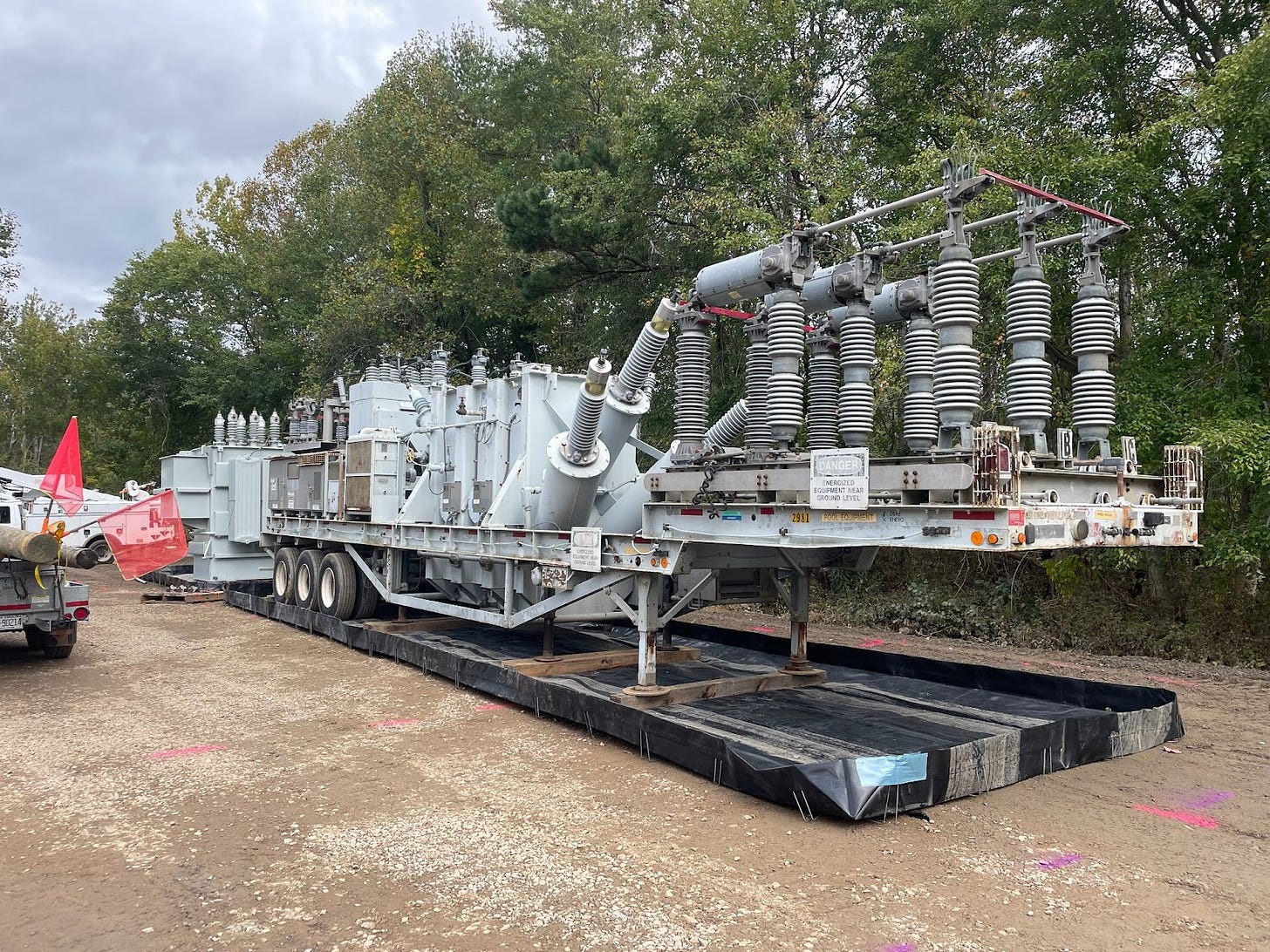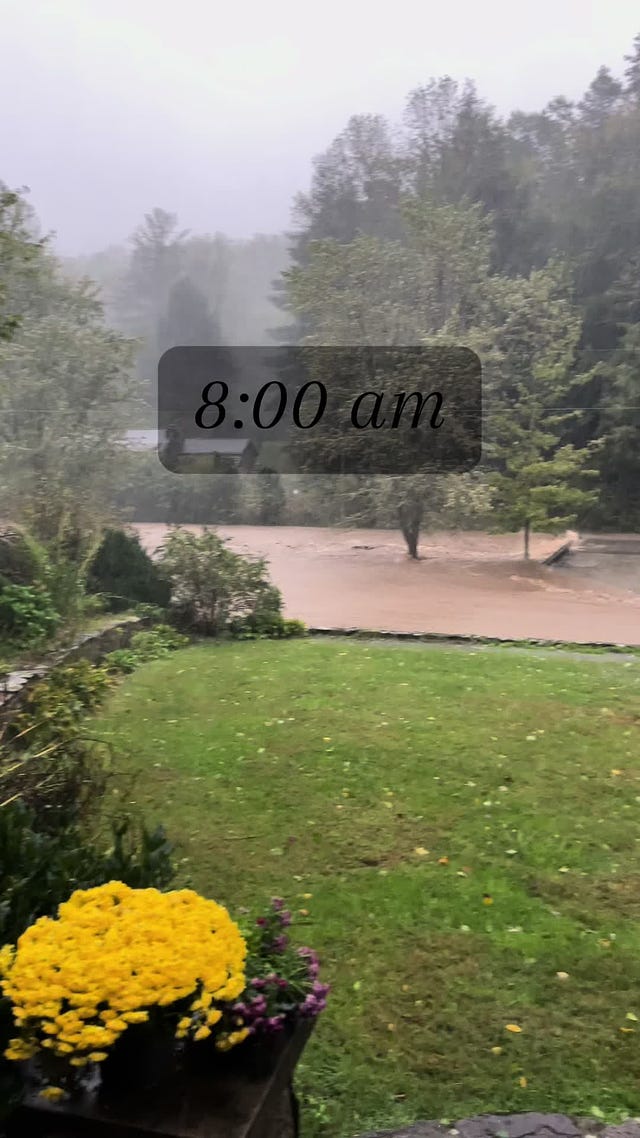Returning to a hometown in survival mode
Plus: Asheville hospital trucking in 200,000 gallons of water daily; Big-name musicians schedule benefit concerts; Harrowing tale of a landslide death; Duke Energy installs mobile substation
You’re reading Mountain Updates, a free pop-up newsletter from The Charlotte Ledger examining the crisis and recovery in the N.C. mountains. Ledger subscribers can add Mountain Updates on their “My Account” page.
Sign up for free:
There’s a constant hum in Western North Carolina. Helicopters buzz overhead all day, some delivering supplies and others searching for missing and stranded people. It’s a sound most Western North Carolinians will never get used to, and are likely to never forget.
I returned to Swannanoa yesterday with my family for the day to check on their house and to volunteer with my hometown church. After a week of scrolling TikTok and looking at photos, I thought I knew what I would see. But to see it in person was even more jarring.
It’s like a movie set: A thin layer of brown dust coats the whole town. The normal crowds of people shopping at Ingles or walking around town have been redirected to churches, school buildings or empty parking lots, where folks now gather to pick up essential supplies, get a hot meal or even pump gas. Camping tents are scattered around town — a makeshift home for people who no longer have one. Military vehicles are on the roads, and men and women in uniform can be seen loading cases of water into the backs of cars. Stores and restaurants have boarded up their doors and windows to keep out looters. Everyone looks exhausted, and the grime and odor coming off people are the least of their worries.
Black Mountain Presbyterian Church has become a relief hub in the valley. The sanctuary, fellowship hall, narthex, offices and even the bathrooms are full of donated supplies. (Photo courtesy of Black Mountain Presbyterian Church)
But it’s not a movie, and those people are not extras. In Western North Carolina, time has stopped. Everyone is in survival mode. There are only two places to be: At home (or for many, a shelter or family member’s house) or at a distribution site to get supplies for the day. Most people are not working their normal jobs right now, which means many aren’t receiving a paycheck.
Now, back in Charlotte, it feels strange that life continues on as normal. I can just walk into a grocery store and buy a loaf of bread. Even flushing a toilet and washing my hands feel weird, and I had been without running water for only a few hours.
Swannanoa residents have an inside joke. We call the town (which is technically a township) “Swanna-nowhere,” because there’s very little to do there. Looking at the ruins of the beloved valley where I grew up, I imagine nobody will call it that again.
Let’s check in on the rest of the region:
Update on Helene response: Gov. Roy Cooper reported progress in recovery efforts Sunday, with over 6,500 people rescued or assisted by 1,600 responders, National Guard and military personnel. Communication in Western North Carolina has improved, with 80% of cell service restored, and FEMA is installing fiber optic cables to help in inaccessible areas. Search and rescue operations continue, along with efforts to clear roads and deliver essential supplies. (Business NC)
Power update: As of Monday morning, Duke Energy reported about 67,000 power outages in the Asheville area, about 2,000 in the Marion area and about 22,000 near Fletcher.
Status of Ingles Markets’ mountain locations: Ingles Markets, the main grocery store chain in Western North Carolina, reports that 13 of its 198 locations are closed. The distribution center, which is located in Black Mountain, was also damaged by the hurricane. (Business NC)
Asheville hospital trucking in water: Mission Hospital in Asheville, which is the main hospital in Buncombe County, is trucking in 200,000 gallons of water daily to replace the city’s water system. Hospital officials say “additional wells” may be drilled for the facility’s HVAC systems. (Business NC) My cousin, who is a nurse at Mission, says mobile units have been brought in for nurses to shower and wash hands, and staff are receiving free hot meals while they work.
Toxic mud: There have been a few reports of toxic mud along the Swannanoa and French Broad rivers following Hurricane Helene, according to the N.C. Department of Environmental Quality. People are encouraged to stay away from mud, rivers and creeks at this time. Asheville-based environmental nonprofit MountainTrue has been collecting mud samples to test for toxins.
Schools update: WLOS released a list of school openings and continued closures. Schools in counties less affected by the hurricane, like Clay, Cherokee and Graham, have reopened, while schools in Avery, Buncombe, Madison and Mitchell, and Old Fort Elementary in McDowell County, are still closed “indefinitely.”
Limits on I-77 toll rates: I-77 Mobility Partners announced a temporary ceiling on its express lane toll rates to lower the financial impact on critical transportation for relief efforts in Western North Carolina.
Black Mountain Presbyterian’s relief hub: Learn more about the hurricane relief efforts taking place at Black Mountain Presbyterian Church in this uplifting article from The Valley Echo, the town’s local news source.
Mecklenburg added to FEMA list: Mecklenburg and Swain counties were added to the list of areas where residents are eligible for federal disaster assistance. (WCNC)
Big-name NC artists and local music organizations schedule benefit concerts for Western North Carolina
The North Carolina music industry is showing up for Appalachia in a big way. Conferences, concerts and galas have announced fundraising efforts for Western North Carolina’s recovery.
◼️ Eric Church, Luke Combs, Billy Strings and James Taylor will perform on Oct. 26 at Bank of America Stadium in Charlotte for what they’re calling a special “Concert for Carolina” presented by Explore Asheville, Asheville’s tourism organization. All proceeds will go to hurricane relief efforts in Western North Carolina. Tickets go on sale Thursday at 10 a.m.
“Without hesitation, the Teppers offered Bank of America Stadium as a venue and everyone united [to] the make the benefit concert a reality as swiftly as possible,” organizers told WCNC.
◼️ Last week, Eric Church released his new song “Darkest Hour,” with all royalties also going toward relief efforts.
◼️ Confluence, a multi-day music conference and showcase festival in Charlotte, said it will donate at least half of the profits from merchandise sales to Western North Carolina. The conference, which starts Wednesday, has three speakers and two performing bands from the Asheville area.
◼️ Charlotte Folk Society and St. Martin's Episcopal Church recently announced Music for the Mountains, a music gala on Oct. 27 that will go to support mountain musicians and artists. The gala will also be collecting monetary and supplies donations.
Quotable: ‘He screamed for her again and again and again. But she was gone.’
It was love at first sight for Jamie and Melissa Guinn and their rustic, cabin-like home in the town of Minneapolis, N.C. Hurricane Helene triggered landslides that took out their house — and took Melissa’s life.
In a poignant and wrenching article, The Charlotte Observer’s Théoden Janes shares the story of Melissa’s life and death through the eyes of Jamie, who survived the hurricane with their 8-year-old son, River. Jamie details their Thursday, which was relatively normal besides the heavy rain. They even had electricity early Friday morning.
But at 11 a.m. Friday, they heard a crash.
Jamie felt himself being crushed as the house seemed to cave in on him. The house groaned and popped and snapped as it slid down the bank into the river. Jamie screamed for River, who called back in a way that implied to Jamie that his son was OK.
Although Jamie was bleeding from a gash in his head and his back was in searing pain (he’d later learn his spine was fractured), he was able to get clear of the wreckage and make his way halfway up the bank to where River was stuck in muddy water.
As Jamie was picking him up, he looked up and saw Melissa standing over the foundation where the house had been — just in time to hear her scream, “Babe, watch out!” In the next moment, he shoved River up the riverbank and lunged after him. Then an instant later, there was another thunderous crashing sound as a third landslide pummeled their property.
When he looked up again, Melissa was no longer there. Jamie raced up the hill as fast as he could, fighting against gravity, mud, serious injuries and panic. He got to where their house had stood just a few minutes earlier and saw nothing but a swath of empty land. He screamed for her again and again and again. But she was gone.
Photo of the day: Mobile substation installed in Swannanoa
Thousands of people are still without power. Duke Energy has installed mobile substations in certain areas that have been more difficult to repair, like the one pictured above in Swannanoa. (Photo courtesy of Duke Energy)
Watch: Time-lapse of the rising river in Black Mountain
—
Lindsey Banks, a native of the Buncombe County town of Swannanoa, is a staff reporter with The Charlotte Ledger. Reach her at lindsey@cltledger.com.
How to help
We’ve had some inquiries about how to help pets and animal shelters in Western North Carolina. The Asheville Citizens Times reported on a few shelters in need of donations.
While supply donations are appreciated, monetary donations are needed just as much right now. Many organizations have deployed groups across the region, tasked with distributing food, water and supplies. You can donate to their efforts at the links below.
Hearts with Hands, a local disaster relief organization, has a donation page to provide food, supplies and water.
United Way of North Carolina has established a fund to help residents affected by the flooding.
The American Red Cross is accepting donations to help residents in the Southeast.
Samaritan’s Purse, which is headquartered in Boone, is scheduling volunteers to help with debris cleanup.
Operation Blessing has a donation page to provide food, supplies and water.
Need to sign up for this e-newsletter? We offer a free version, as well as paid memberships for full access to all of our local newsletters:
➡️ Opt in or out of different newsletters on your “My Account” page.
➡️ Learn more about The Charlotte Ledger
The Charlotte Ledger is a locally owned media company that delivers smart and essential news through e-newsletters and on a website. We strive for fairness and accuracy and will correct all known errors. The content reflects the independent editorial judgment of The Charlotte Ledger. Any advertising, paid marketing, or sponsored content will be clearly labeled.
Like what we are doing? Feel free to forward this along and to tell a friend.
Social media: On Facebook, Instagram, Twitter and LinkedIn.
Sponsorship information/customer service: email support@cltledger.com.
Executive editor: Tony Mecia; Managing editor: Cristina Bolling; Staff writer: Lindsey Banks; Business manager: Brie Chrisman








